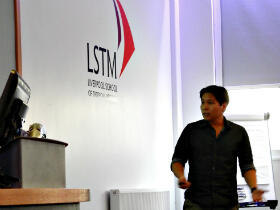
There was a special seminar at LSTM this week, when Dr Helder Nakaya, Assistant Professor at the University of São Paulo (Brazil) and Adjunct Professor at Emory University School of Medicine (USA) delivered at talk entitled: Systems biology of Zika Infection. He was introduced by LSTM’s Dr Daniela Ferreira.
He began by explaining how systems biology, an interdisciplinary field that combines systems-wide measurements, networks and predictive modelling, can be used in the context of vaccinology. Dr Nakaya talked about the advances in technology that had led to an increase in data that is available for analysis. His group working in a dry lab with computers only, is developing tools to help deal with this increase and working with other traditional lab based scientist to ensure that this data is translated into knowledge that leads to a deeper biological understanding.
Dr Nakaya explained that using computational modelling it is possible to make predictions about the mechanisms of vaccine induced immunity and using an inter-disciplinary, holistic approach his group has done so for Yellow Fever, influenza and Meningococcal vaccines among others. He talked through a number of examples from work that had been published including the importance of understanding why vaccines work differently within different groups of people – such as with the influenza vaccine which is particularly effective for younger adults but not as much as for those who are old or the very young.
Given that different genes are responsible for the immune response to different infections Dr Nakaya and his team have created a bioinformatics tool that can be used to predict the immune response to a number of infectious diseases. Talking through some of the unpublished data from his team he explained the work that was currently being undertaken in relation to the Zika virus, looking at the infection, transmission, convergence and microcephaly, the results of which it is hoped will feet into the development of an effective vaccine.